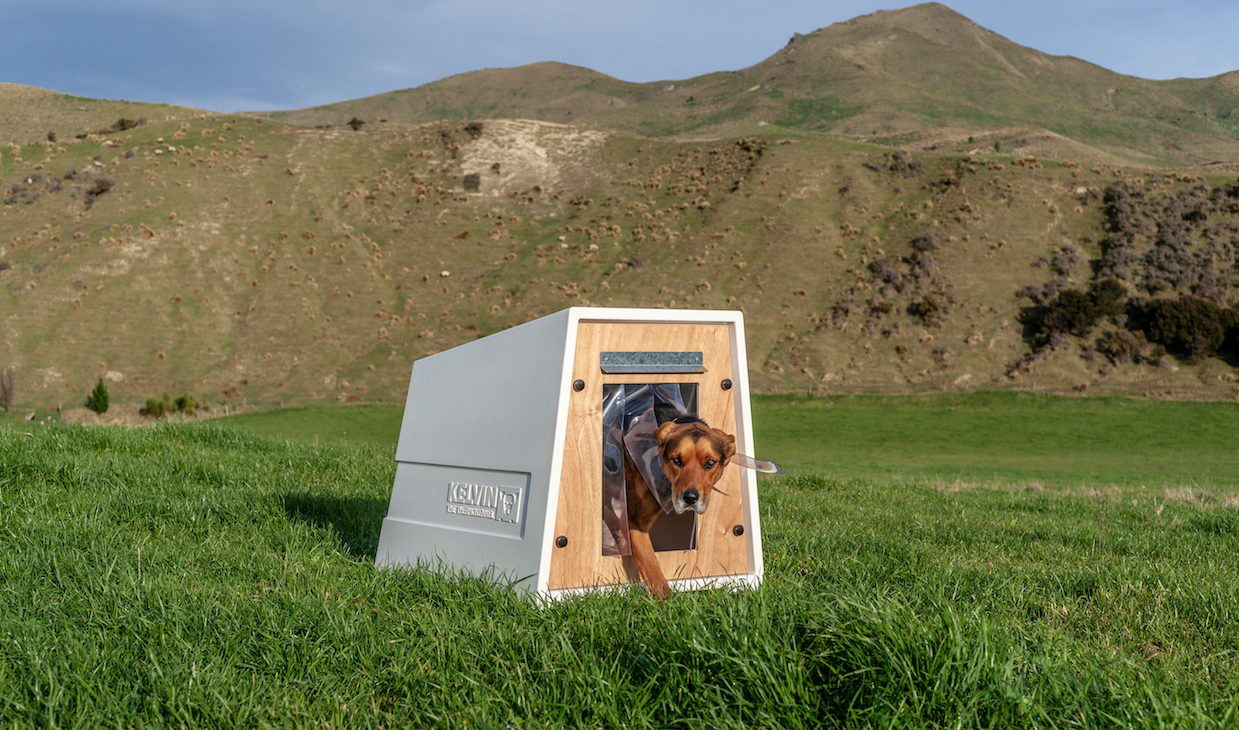
Kelvin – the Thermokennel began as a family affair, with Rosie Todhunter evolving her grandfather Tony’s original homemade kennel.
“My grandfather, who passed away years ago, thought there was a better way to house dogs than what was currently being done. So, he got a chemical drum, pulled one apart and lined it and stuck it back together with insulation panels between the inner and outer shell. Once he died we had these kennels lying around and I thought it would be a great idea, so I built on it from there,” says Todhunter.
She comes from a family of sheep and beef farmers and is based south of Blenheim where she has six working dogs on her farm, plus a cocker spaniel.
In 2014, she took her concept up to the New Zealand National Agricultural Fieldays at Mystery Creek, Hamilton, where she took home a Grassroots Merit award from Fieldays Innovations.
It was here she met Tim Allan, founder of Tauranga-based product development company Locus Research, who jumped at Todhunter’s product, with the company now investing a 50 percent stake in the business.

Daniel Faris, chief executive of Locus Reseach, says Kelvin – the Thermokennel is a good example of why the company exists – “we’re here to identify good ideas.”
“Locus Research is able to provide the heavy lifting…we saw the potential in Rosie, in her belief. We’re thrilled she agreed to work with us,” says Faris.
As well as being economically viable, Faris says the thermokennel is a wonderful animal product while being durable enough for life on the farm.
A team of six people from Locus Research, each with a background of different disciplines, worked with Todhunter and used her farming experience to ensure key user perspective and collaboration was part of the redesign and development of the kennel.
The team at Locus Research found that resting dogs produce as much heat as a standard light bulb – which the thermokennel captures and retains inside through quality insulated walls, floor and door, meaning a warm and dry environment for a dog.
The one-piece design prevents water entering the kennel, while durable and UV resistant construction ensures it’s waterproof, wind resistant, and weather tight. The raised plywood floor means the wet, frost, and ground temperature won’t disturb the interior climate.
The kennel is also made with an environmentally stable and UV-resistant plastic that won’t deteriorate or rot over time. It also has a removable front panel and floor for easy cleaning, while the front can also be left off on hot summer days.

When asked why the thermokennel is called Kelvin, Faris says it’s for two reasons. One, it’s a good name, and two, the kelvin is a measurement of temperature – a fundamental part of the product.
Faris says key challenges for the redesign including making sure the kennel was easily able to be cleaned, as well as making sure dogs were not able to destroy it.
Todhunter says she thinks Locus Research liked what she offered due to its simplicity.
“You see a lot of technology around that is quite complicated and complex, this kennel is really simple…there’s nothing else like it on the market, and we’ve made [the kennels] so that they can be adapted onto already existing runs.”
The core design is for working dogs such as border collies or huntaways, however, Faris says there has been interest from people who don’t have working dogs so there is the opportunity in the future to extend to smaller and bigger kennels.
“A lot of my connections are in the agricultural sector so I’d like to think we can definitely sell it – I’ve seen immense interest in the product,” says Todhunter.
And she reckons there will eventually be as big a market outside of the farm gate as there is within it.
Taking advantage of the interest a 30-day Kickstarter has been set up, with different levels of pledges available. The aim of the Kickstarter is to raise $68,130 towards the tooling and materials needed to get the first kennels out into the world.
Todhunter says she thinks her grandfather would be excited to see where the original kennel was at now.
“…and I’m just excited to do something that benefits New Zealand and the New Zealand farmers.”





